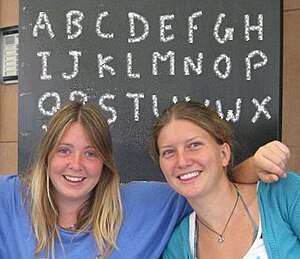I was born under a lucky star, or so my Dear Old Mom tells me. She was born of Irish immigrants to Canada, who taught her to always look on the bright side of life, with a good dose of chin-up and carry-on when things didn’t go as planned. She and my Dad taught me to ski before I could walk, and how to teach skiing before I could drive (driving age is 16 in Canada).
My lucky star was being able to teach, that meant I was able to earn money, then own my own pick-up truck. Every Canuck buck wants to own a truck but the thing is you need an income to be able to keep one, same as today. I may have changed my choice of car but still need the money to keep it.
The Internet was how I managed to carve out a living, so that was another part of lucky star status. I saw the web really early and jumped all over it, had my first web design company before the mid 90’s. Mostly through consulting work and webmaster contracts I was able to support a nice lifestyle in South Florida, although it was up and down since we were all learning at the same time and the Industry was so new and unexplored.
Nowadays the U.S. Expat has a major advantage throughout the world in the Internet niche because most of the rest of the world want U.S. Talent, knowledge and experience, especially as in the case of countries where allot of those people want to travel to USA, like China and Brazil for example, where it’s right of passing for middle class and up to make trips abroad.
The key thing to know about becoming an Expat is that there’s more opportunity and often much bigger opportunities when you can provide a bridge between your culture and local knowledge and that of your new foreign home. The world is your oyster, when you’ve got a skill-set, that can help other people succeed.
When I first left Canada I was young and had serious wanderlust, funding my adventures was no easy feat. Several people I knew taught skiing and/or English, one friend that I admired in particular was Max, because he stayed in college to obtain an economics degree, then moved to Japan to teach English in a corporation.
Max had a thing about him, aside from being very smart, he was an absolute freak for mountain sports and outdoor recreation of all kinds. Ace tennis player and great golfer but even before snow boards arrived, he loved heli-skiing and knew about these incredible areas in British Columbia because we had planted trees in these mountains (for summer jobs). That’s how Max and I met.
Now that you have the backstory, while Max was in Japan teaching English to corporate execs, he was always talking about the back-country sports of BC. Next thing you know he’s opening an adventure guiding business in Canada, when Snow Boards arrived Max was among the first riding them, so he jumped all over the opportunity. Shortly thereafter it was Max throughout the mid 80’s that was showing Warren Miller and other ski film makers where to heli-ski. Max was the guide to the guides. To this day Max lives at Whistler, still involved in the hospitality industry and still helping Japanese people have an awesome experience in Canada.
There are so many examples of the foreigner next door. Everyone can remember someone in their life, who had a funny sounding accent. My life growing up in Western Canada was all about sports and recreation.
In the ski teaching business we would meet interesting people all the time, people from the farthest corner, end up at ski chalets. Especially common near ski resorts and water sports are Australian’s and Kiwi’s (New Zealanders). My young impressionable life was filled with great stories about “Down Under”, as my winters were filled with many weekends with my Oz and Kiwi mates, at our ski club. We loved to ski together, the deeper and steeper the better!
These people were smart, sophisticated, experienced and very determined to live free and prosperous. Their timing made them appear to be Hippy but they were world-wise way beyond their youthful appearance. World travel had also taught them about cultural cuisine, and they loved to cook fabulous foreign dishes and entertain large groups of us, with music and wine from the various regions of the world, to match the meal.
One winter we made our own Saki from rice, then at the end of the season, enjoyed an authentic 7 course Japanese dinner party with the homemade rice wine. It tasted great, as did incredible Mexican and my personal favorite Greek dinners, all of which were very novel to me, at 16 years old.
Teaching skiing taught me how to help people get what they wanted. This is what is so fundamental about our language, more than half of the world wants to learn English.
All of the people I mentioned above, and just about anyone who has ever lived overseas, has at one time or another, taught English to someone. It’s part of humanity, to try to exchange languages. It is the most common principle of good-will, to show an interest in another person’s culture, to speak their words.
The best thing about Teaching English is the people you meet, and that you are becoming an Ambassador of our language. You are helping someone else get what they want, that’s what creates value, and it’s the most common way to make money while living overseas.
The greatest thing in today’s English teaching community is Internet video, as many people want to learn online but still the basis of the teaching starts with a book at a table, with the student sitting beside you. It’s a one-on-one style method, where the book does the work but you need to be taught how to teach.
It’s highly recommended, that anyone embarking on a serious global Expat exploration being armed with more money making methods, than just teaching English. However, always be proud and happy to teach, it’s an excellent means of immersion into a foreign country.
Remember it’s an honor to be invited to anyone’s kitchen table, to teach them how to speak English. You benefit in many more ways, for sharing your time with people, than just the money in your hand.
Classroom teaching is another realm and above my pay-grade but I imagine that it’s the same in that your let the books do the teaching, just follow the words in the book and do the best that you to help people get what they want – and – if all else fails in the class – speak English!


No comments yet.